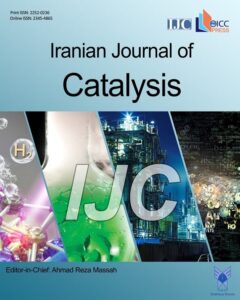
1,2-Diketones have been reacted in one-pot method with 1,2-diamines at room temperature with ZnO nanoparticles as a catalyst. ZnO nanoparticles as an available and reusable catalyst is used for the synthesis of Quinoxalinein improved yields.
The aryl-(Z)-N-[2-amino-1,2-dicyanovinyl]formamidine 2 cyclize in solvent-free conditions and in the presence of a base to give a 5-amino-1-aryl-4-cyanoimidazoles 3. Silica sulfuric acid as an efficient and reusable heterogeneous catalyst has been used for the preparation of amidines 2 from formimidate 1 through reaction with aromatic amines at room temperature and in good to excellent yields. […]
A highly practical and efficient preparation of pyrano[3,2-c]pyridone and pyrano[3,2-c]quinoline derivatives was developed via an ionic liquid mediated and promoted multi-component reaction of malononitrile, aldehyde, and 4-hydroxyquinolin-2(1H)-one or 4-hydroxy-6-methylpyridin-2(1H)-one. The combinatorial syntheses were achieved for the first time without applying extra activation energy at ambient temperature while making use of [BMIm]Cl as a catalyst solvent.
A simple, novel, efficient and three-component procedure for the synthesis of pyrimido[4,5-d]pyrimidine-2,4-dione derivatives by the reaction of 6-amino-1,3-dimethyluracil, aldehyde and 2-benzylisothiourea hydrochloride promoted by ionic liquid 1-butyl-3-methylimidazolium bromide ([BMIm]Br) under solvent-free conditions is reported. The presented method is benefited from operational simplicity, simple workup and reusability of ionic liquid. These products were evaluated in vitro […]
Nano silica-H2SO4 is an efficient and mild catalysis system for the regeneration of aldehyde from aldoximes. Ketoximes are converted to amides by Beckmann rearrangement in the presence of nano silica-H2SO4. The reactions are carried out in solvent-free conditions under microwave irradiation (600 W) within 50-120 sec in good yields.
An efficient synthesis of 2,4,5-trisubstituted and 1,2,4,5-tetrasubstituted imidazoles by one-step condensation of an aldehyde, benzil, ammonium acetate and primary amine in the presence of nanocrystalline magnesium aluminate under microwave irradiation is described. The advantages of this catalyst are including simple work-up, low cost and reusability. Compared with conventional methods, the main advantages of the present […]
A series of 2-amino pyridine-3-carbinitrile derivatives incorporated coumarin moiety has developed via multicomponent condensation of 3-acetyl-2H-chromen-2-one, arylaldehydes, malononitrile and ammonium acetate utilizing Brønsted acidic ionic liquid, (4-sulfobutyl)tris(4-sulfophenyl)phosphonium hydrogen sulfate as catalyst under solvent-free conditions. Good yields, short reaction times, straight forward workup, reusability of the ionic liquid and green conditions are the most obvious advantages […]
Palladium (II) coordination complexes catalyze the reaction of alcohols with ketones to yield ethers. During the catalytic cycle, the alcohol adds selectively to the β-carbon (anti-Markovnikov). In this work, mechanism and kinetics for the reaction of methanol with methyl vinyl ketone (MVK), being catalyzed by Pd, has been theoretically investigated in detail. Using quantum mechanical […]